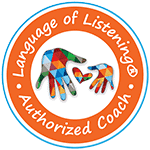Inside: How to get clear on setting limits with your strong-willed child without feeling overwhelmed and defeated. Plus, the biggest misconception I see in working with parents of strong-willed kids.
I sat at the kitchen table with my laptop firmly resting beneath the pads of my fingertips. What I typed next was something I shared all too often with parents wanting to set limits with strong-willed kids:

“I can tell you’re really trying to understand your son and help him feel successful in SO MANY ways. You can see this especially when you try to stay present with him as he continues expanding on what he was telling you, despite your boundary being a certain amount of time prior. You’re using the chore chart because you want him to be responsible, and it seems like a reasonable framework to help him achieve success. I can even hear the concern in your voice over what is happening at preschool with his meltdowns. You’re worried, and more than anything, you want him to enjoy a peace and calmness in his heart.”
Wait. Let me back up.
You’re probably wondering what the parent asked about in the first place.
(more on that in a second)
But without knowing the question, I know you can feel a touch of familiarity in the words.
You’re trying to help your strong-willed child feel successful.
You’re working to teach him the life lessons he needs to survive in this world.
You’re creating the structure and the framework she needs at home.
You’re giving it all you’ve got with this kid.
And yet, the battles continue.
You ask yourself, “Why at the end of the day is this so stinkin’ hard?”
Deep down, you’re genuinely concerned because today it’s incessant fights over dinner and bedtime. In five or ten years, it’s fights over curfews, social media, drugs and any rabbit hole you’re willing to let your mind travel down.
It’s overwhelming – dealing with a strong-willed child.
This is something no one really talks about, but in order to parent a strong-willed child, you have to get to the heart of the issue.
You have to understand what’s really going on beneath the surface. From there, the answers become so. much. clearer.
Setting limits with your strong-willed child starts here.
Strong-willed kids are often seen as defiant or rebellious because grown ups say one thing and the kids do the complete opposite or they seem to struggle immensely with boundaries.
If you’re able to see strong-willed kids in a completely different light, what you actually have on your hands is a child who is very self-directed and a child who has been trying to create his own boundaries for a long time. This can lead to a lot of chaos and missed communications.
Related: 10 Highly Effective Phrases for Raising a Strong-Willed Child

Strong willed kids are typically fine with boundaries (how a grown up likes or doesn’t like things), and what they are actually struggling with is the rule (one of the million different ways to help the child bounce from our preferences / boundaries and find a way to meet their own needs of power, experience and connection).
Since boundaries are a crucial part of parenting strong-willed kids, let’s go deeper here:
Boundary – what you or the teacher or another grown up likes or doesn’t like, wants or doesn’t want for the child. Getting more clear on the boundary can help you enforce it without feeling like you have to move a mountain in a day.
For example, if you want your child to help feed the pets, clean up toys, clear plate after meals, brush teeth and show respect, it sounds like your REAL boundaries are three things:
1). Raise a responsible kid
2). Raise a kid who takes care of things (another layer of responsibility)
3). Raise a kid who treats others well.
Rules – These are all the different ways you can help a child accept a boundary and meet their needs within a boundary. For example, feeding the pets is just ONE possible way to help a child learn responsibility, caring for things and treating others well. If this rule isn’t working so well, you can change it or create a new way to help a child learn responsibility.
Understanding the difference between rules and boundaries is the foundation for bringing more clarity to the whole situation – so you can help strong-willed kids shift into cooperation.
Related: 3 Things Every Parent of a Strong-Willed Toddler Should Know
Now here’s the nitty gritty of what’s really happening.
With strong-willed or self-directed kids, they will have a very high need for power and control. They will attempt over and over to set their own boundaries – it’s why it’s so important that we get clear on our own boundaries, but flex on the rules the child needs to accept the boundary.
It makes so much sense why strong-willed kids don’t respond to “punishments” and why they continue to fail over and over again with charts and more control.
One of the biggest misconceptions out there in the world is that kids learn best by failure, when the truth is kids learn best by success. Disappointment and mistakes are all part of life. There’s no doubt about that. But as parents, we can help our kids find possibilities for success even when they mess up. That’s the problem-solving skill that will serve them well for life!
Related: How to Stop a Whining Child – Immediately
Helping strong-willed kids want to cooperate.
A few simple ideas to help strong-willed kids want to cooperate with you.
1. Get clear on your REAL boundaries.
Often times in parenting, we accidentally back ourselves into a corner saying things like, “You have to pick up the toys now.” Now, you’re pegged and have to somehow make them pick up the toys or “else” you start to lose your authority.
Instead of thinking of your boundary as “picking up the toys right now”, your REAL boundary might be that you want to raise tidy and responsible kids. And your preference is to keep a tidy home. Well, there’s a million ways to do that. Cleaning up the toys at this exact moment in time is only one possibility.
2. Help strong-willed children find success using rules.
Think of all the ways a strong-willed child can learn to accept your boundary using the infinite possibilities that come with rules.
Using the tidy or clean up example, look for options where your child is most cooperative and start there. Kids learn best by success, so each time your child is successful, be sure to name that as a STRENGTH. This helps tie the STRENGTH (what the child did well) to a behavior or action. And here’s the important part: The child’s future actions are based out of STRENGTHs.
Here are some ways that even young children can show strengths of tidiness and responsibility:
- Put away folded laundry into drawers.
- Clears plate from table.
- Does self-care for oneself (i.e. teeth brushing, combing hair, getting dressed)
- Use a handheld vacuum or broom and dustpan to clean small messes.
- Grab a towel and clean up a spill.
- Put away toys.
- Pull weeds.
- Make bed.
Before making a rule, look for times of day when your child is most successful. Waiting until bedtime to clean up toys can sometimes be more like gas on a fire than a peaceful singing of kumbaya.
3. When rules aren’t working, change them.
It’s up to us as parents to help our kids find success with life skills that are important. When things aren’t going so hot, it’s up to us – the parents – to shift the structure and the framework we provide for kids to help them find success. Kids can even participate in problem-solving what rules might work better.
Related: 13 Habits That Raise Well-Adjusted Kids

So for example, instead of cleaning up toys before bedtime, you and the child can shift into problem-solving a different rule that might work better.
It might sound something like this:
“The toys need to get picked up at some point today. There must be something you can do to remember to pick up the toys. Maybe there is a time you like to clean up. Maybe there is a fun game you like to play while you clean up. Maybe there’s a different job you want to do to help out around the house, and we can remove some of the toys so there isn’t so much mess. Lots of options! Let’s make a plan together.”
If your child is consistently struggling with a rule like cleaning up the toys, you can help your child experience success by helping them “back up.”
This is where you’d, for example, reduce the amount of toys in the house so there are only small messes to clean up vs. big messes that only leave us, as parents, feeling triggered, angry and resentful when kids can’t or won’t do it.
Each time your child is more successful with small messes, you can start to move onto bigger messes. Start with success, not failure.
“My child has been strong willed since birth.”
“He knows what he wants—so much so that a lot of ‘punishments’ don’t phase him. He will just keep on doing his own thing and doing what he wants. What is challenging with him seems to change daily and there has yet to be a day in his life that he hasn’t cried. He really is a sweet kid and there are some days that are really good and there are a lot of days that are super frustrating for everyone.” – Concerned mom of a strong-willed kiddo
These are common words that I hear from concerned parents all the time. If you hear these words in your head too, then you need to know this…
You’re trying to help your strong-willed child feel successful.
You’re working to teach him the life lessons he needs to survive in this world.
You’re creating the structure and the framework she needs at home.
You’re giving it all you’ve got with this kid.
These are life long skills that are built slowly over time with strong-willed kids. There’s a million ways to help them grow into happy, healthy and thriving adults.
Hold your boundaries – they desperately need it.
Flex on the rules – they desperately want it.
Print this free listening checklist.
This post comes with a free printable checklist to help with listening. I always have the hardest time remembering these phrases. This printable simplifies it!
Here is a sneak preview…
Download Your Free Printable
- Download the checklist. You’ll get the printable, plus join 37,000+ parents who receive my weekly parenting tips and ideas!
- Print. Any paper will do the trick, but card stock
would be ideal.
- Place it on your refrigerator. Check things off as you go and don’t forget a thing!
Want more on parenting?
- The Most Overlooked Reason Why Kids Won’t Listen
- Dealing With Controlling Kids? The “Secret Sauce” to Gaining Cooperation
- 7 Things That Will Dramatically Change How You Stop a Temper Tantrum
- The Most Powerful Way to Respond When Your Child Feels Hurt or Rejected
I've created a free email series just for you! If you are struggling with teaching your child to listen, this series will help transform your parenting. Yes, really. I've seen my proven strategies work time and time again for parents. I know it can work for you too.
After taking my free email series, you will:
- Learn simple, yet highly effective listening strategies
- Experience a stronger connection with your child
- Enjoy more peaceful parenting days
- Gain more cooperation from your child














Such clarity on the difference between boundaries and rules! You’ve turned it into a practical tool…of course! Wonderful post. Thank you <3 — Sandy
The challenge I have is:
My self directed son is third child. What I want is for him to allow his older brothers to play a game or do their homework without messing it up.
I play a game with him first and he still doesn’t allow them to have any time with me.
Please advise
Thanks
THANK YOU, THANK YOU, THANK YOU….from Australia!
The information I receive on here is guiding me and teaching me and I’m learning how to become the kind of parent I want so badly to be. Thank you so much …Natalie
So clear. I’m a parent of two strong-willed teenagers and am also an SLP in the schools. I’ve been sharing your info during parent info talks we hold for our preschool. Do you have info regarding teenagers, too?
Hi Lauren, thank you for your information, it is very sensible and love it. Many thanks. Elizabeth
Hi Lauren, thank you so much for all this much needed information. I have two kids but the biggest challenge at the moment is the strong willed 5 year old. I saw immediate results when I picked her up from school on Friday and started role playing. Cleo from South Africa.
I have to remind myself of this often, setting boundaries (not just for myself but for my daughter as well), is so helpful and something that we don’t always remember to do. When she (and I) hear the word “rule” — it just sets us off.